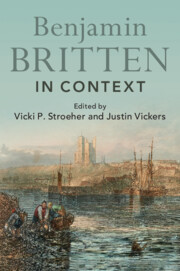3 results
Positioning Britten
- from Prologue
-
-
- Book:
- Benjamin Britten in Context
- Published online:
- 31 March 2022
- Print publication:
- 21 April 2022, pp 3-10
-
- Chapter
- Export citation
Chapter 9 - Britten and the Radio
- from Part II - British Musical Life
-
-
- Book:
- Benjamin Britten in Context
- Published online:
- 31 March 2022
- Print publication:
- 21 April 2022, pp 78-85
-
- Chapter
- Export citation

Benjamin Britten in Context
-
- Published online:
- 31 March 2022
- Print publication:
- 21 April 2022

